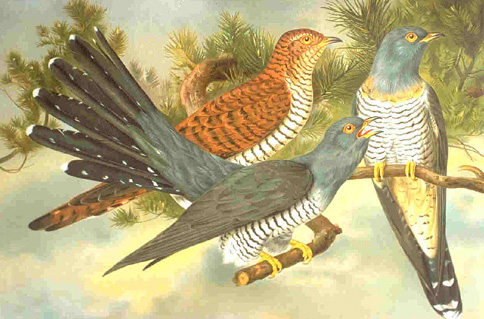The Bonny Cuckoo
Le coucou est considéré comme le messager du printemps.

The Bonny Cuckoo
Le joli coucou
Chanson traditionnelle
Chanson traditionnelle
(Anglais)
(Français)
My bonny cuckoo, I tell thee true
That through the groves I'll rove with you;
I'll rove with you until the next spring
And then my cuckoo shall sweetly sing.
The ash and the hazel shall morning say,
Oh bonny cuckoo, don't go away;
Don't go away, but tarry here,
And sing for us through all the year.
Cuckoo, cuckoo pray tarry here,
And make the spring last all the year.
Mon joli coucou, je te dis vrai,
Qu'à travers les bosquets avec toi j'errerai ;
J'errerai avec toi jusqu'au prochain printemps,
Et puis mon coucou chantera doucement.
Le frêne et le noisetier diront le matin :
Oh, joli coucou, ne t'en va point :
Ne t'en va pas mais attarde-toi ici,
Et toute l'année chante pour nous.
Coucou, coucou, attarde-toi ici s'il te plait,
Et fais durer le printemps toute l'année.
Notes
Voici la version de "Ancient Music of Ireland" (1840)…
My bonny cuckoo, I tell thee true
That thro' the groves I'll rove with you;
I'll rove with you until the next spring
And then my Cuckoo shall sweetly sing.
I'll rove with you until the next spring
And then my Cuckoo shall sweetly sing.
The ash and the hazel shall mourning say,
My bonny cuckoo, don't go away;
Don't go away, but tarry here,
And make the season last all the year.
Don't go away, but tarry here,
And make the season last all the year.
Traduction française
Mon joli coucou, je te dis vrai,
Qu'à travers les bosquets avec toi j'errerai ;
J'errerai avec toi jusqu'au prochain printemps,
Et puis mon coucou chantera doucement.
J'errerai avec toi jusqu'au prochain printemps,
Et puis mon coucou chantera doucement.
Le frêne et le noisetier diront se lamentant :
Mon joli coucou, ne t'en va point :
Ne t'en va pas mais attarde-toi ici,
Et fais que la saison dure tout l'an.
Ne t'en va pas mais attarde-toi ici,
Et fais que la saison dure tout l'an.

Remerciements
On peut trouver cette chanson dans "Ancient Music of Ireland" d'Edward Bunting (1840). Il l'appelle une ancienne mélodie. La version originale était en gaélique (An chuaich in mhaiseach).



